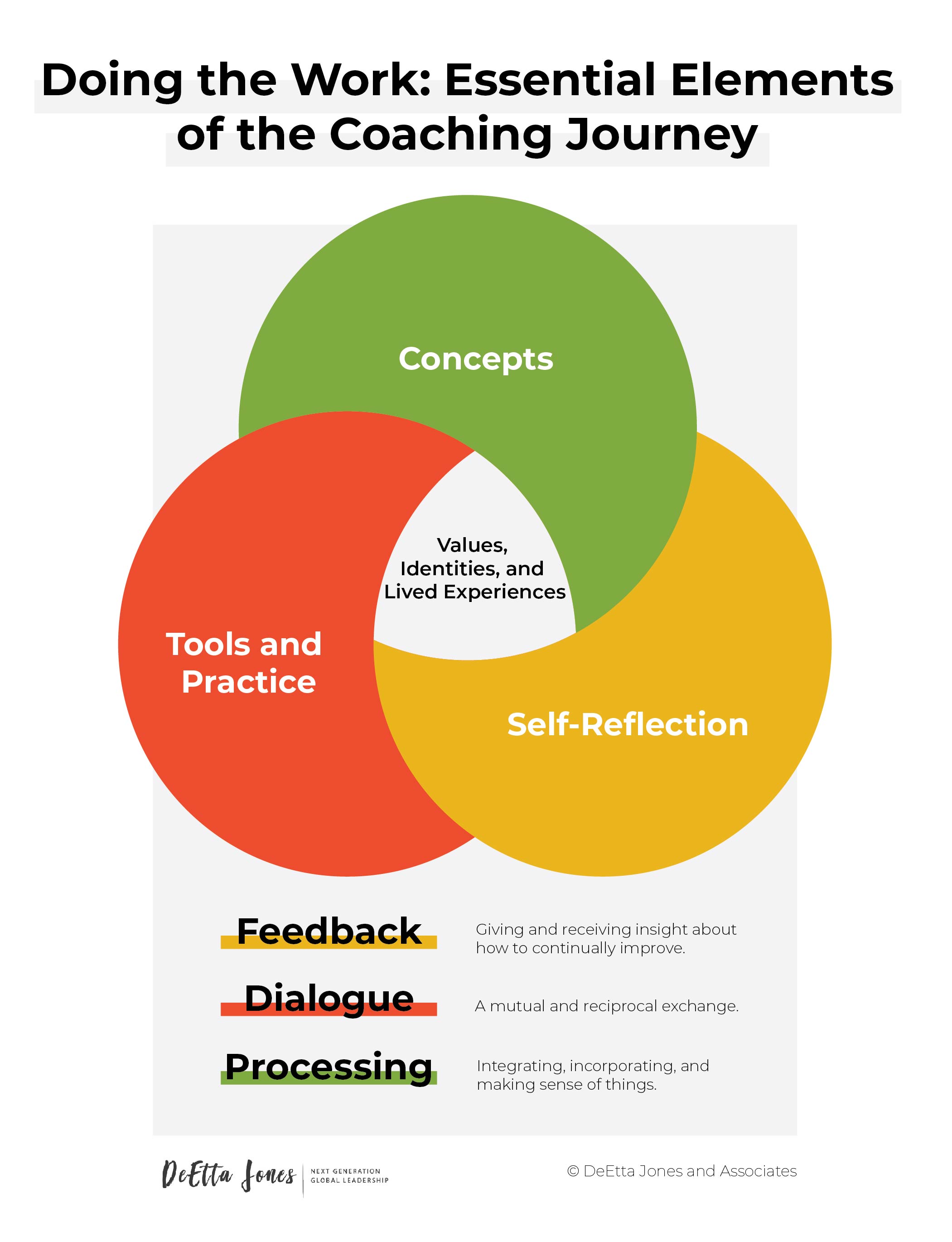Coaching
At a time when personal and professional development are increasingly important, we know there is no one-size-fits-all approach to growth. DJA’s distinctive approach to coaching is that we always center inclusive values, the identities and lived experiences of the people or groups with whom we work.
DJA Coaching Guiding Principles
It’s critical that the client and coach are in sync regarding the underlying philosophy that will inform the coaching process and relationship. The following principles guide the coaching work at DJA, from executive and leadership coaching to organizational strategy and alignment.
- Focus on the Positive
The positive core that is present in all people is the obvious starting point in a coaching relationship. Affirming effective practice is more constructive than internalizing weakness. - Capitalize on Strengths
Coaching should build on personal strengths to identify targeted skill practice toward measurable goals. A strength is the ability to consistently provide near-perfect performance in a specific activity. Talents are naturally recurring patterns of thought, feeling, or behavior that can be productively applied. Talents, knowledge, and skills—along with the time spent (i.e., investment) practicing, developing your skills, and building your knowledge base—combine to create your strengths. - Share Responsibility for Excellence
Both parties must take responsibility for the success of the coaching relationship. This means that communication must be open, timely and honest. It also means both parties: are focused on helping the client meet identified goals; follow through on commitments; and strive for excellence in process as well as outcomes.
MEET OUR CERTIFIED COACHES

Renee Boddie
DJA Coach, Renee Boddie has 20 years combined experience in people leadership, leadership development training and professional coaching in the corporate world where she’s designed, implemented, and led strategically aligned, organization-wide professional development initiatives.
Renee Boddie

Renee Boddie has 20 years of combined experience in people leadership, leadership development training, and professional coaching in the corporate world where she’s designed, implemented, and led strategically aligned, organization-wide professional development initiatives. Her passion lies in creating strong relationships and trust by collaborating with business partners and working with various levels of organizational leadership to provide them with customized guidance, coaching, and consulting.
Renee is an iPEC-certified coach, an Energy Leadership Master Practitioner, and a COR.E Leadership Dynamics Specialist. She has worked with leaders from all walks of life to understand the impact of their energy and harness it to achieve success in work and life. With her coaching clients, she facilitates personal awareness and accountability to promote the high performance of their teams and maximize their leadership effectiveness. Creating an atmosphere of trust, calm, and clarity she helps her clients thrive in times of uncertainty and change, and find the courage to forge a path for their most successful future selves.
As a leadership development facilitator, Renee helps organizations transform culture and facilitate expansive change. Using a practical yet creative style, she fosters growth, accountability, and awareness in her classrooms. She engages her leaders in the learning process so they can overcome their complex professional challenges, and create more productive, fulfilling, and inclusive work environments.
Renee currently resides in Colorado with her husband, two daughters ages 8 & 14, her dog-Duke, and her turtle-TJ Tostido.

Carolyn Embuscado
Carolyn Embuscado is an ICF-credentialed coach and a marketing communications specialist who lives in Maryland. She is passionate about supporting her clients to achieve their greatest personal and professional potential. By helping clients discover insights and by providing accountability, Carolyn empowers people through the transformative process of coaching.
Carolyn Embuscado

Carolyn Embuscado is an ICF-credentialed coach and a marketing communications specialist who lives in Maryland. She is passionate about supporting her clients to achieve their greatest personal and professional potential. By helping clients discover insights and by providing
accountability, Carolyn empowers people through the transformative process of coaching.
Carolyn received formal coaching training through Creative Results Management’s Coaching Mastery Certificate Program, and she has been a certified coach with the International Coaching Federation since 2016. As an ICF member and credential holder, she upholds ICF’s professional code of ethics and universal core values. Having worked in both the United States and in China, Carolyn has enjoyed coaching people located in various states and countries. Her coaching experience includes helping organizational leaders and corporate managers achieve their desired development goals. Specifically, this has included supporting people in the areas of self-advocacy, confidence, communication, career planning, and strategic leadership. Carolyn also has experience providing interactive coaching skills training for 60 mid-level managers of a multinational company.
Carolyn received a Bachelor of Arts in English and has used her marketing communications skills to help numerous clients expand their impact. She is grateful for the opportunity to have served creative marketing agencies, book publishers, consulting companies, small businesses, global corporations, non-profit organizations, and faith-based organizations.
During her free time, Carolyn enjoys going on walks with her husband, journaling, fellowshipping with friends, and making people smile.

Santoshi Goyal
Santoshi Goyal is a certified leadership coach with 14 years of corporate experience, specializing in leadership development (leading self and others), communication skills, and engagement at work. She longs for a world where everyone feels like they have a choice and a voice, and she empowers people to have that through her coaching.
Santoshi Goyal

Santoshi Goyal is a certified leadership coach with 14 years of corporate experience, specializing in leadership development (leading self and others), communication skills, and engagement at work. She longs for a world where everyone feels like they have a choice and a voice, and she empowers people to have that through her coaching.
She is passionate about coaching emerging/ seasoned leaders and individual contributors mostly in tech/financial sectors to show up as leaders in their life and work. This may sometimes look like taking ownership of situations and making the most of them, having a vision and enrolling people for that vision, or having important difficult conversations and holding boundaries.
Her coaching has been built on her experiences of being a software engineer by formal education, 15 years of IT consulting experience for global organizations, 12 years of living abroad, transitioning from 9-to-5 corporate work to entrepreneurship in pursuit of meaning, and coaching 2000+ hours. She started as an IT consultant and consistently enjoyed working with people more than systems or technology. This knowledge guided her to look for a service-oriented field. Finding coaching had the feeling of finding her path or "coming home" and she has not looked back since. She experiences the most fulfillment in meaningful coaching conversations.
She is a certified coach, CPCC by Co-Active Training Institute since Dec 2017, and PCC (Professional Certified Coach) from International Coaches Federation. She has also completed the 10-month-long leadership
program from the Co-Active Training Institute which is considered one of the best leadership programs. She is a certified positive intelligence coach and a certified fireworks career transition coach as well. In addition, she is also certified in debriefing psychometric assessments like Strengthscope and EQ 2.0/EQ360.

Dawn Reid
Credentialed International Coaching Federation (ICF) coach Dr. Dawn Reid previously served as the Vice President and board member of the ICF Philadelphia Chapter. She is also a certified mindfulness trainer with over 10 years of experience in training and development, and 20 years coaching women of color in career strategizing, achieving entrepreneurial pursuits, and creating work-life harmony.
Dawn Reid

Credentialed International Coaching Federation (ICF) coach Dr. Dawn Reid previously served as the Vice President and board member of the ICF Philadelphia Chapter. She is also a certified mindfulness trainer with over 10 years of experience in training and development, and 20 years coaching women of color in career strategizing, achieving entrepreneurial pursuits, and creating work-life harmony. Reid also offers rigorous ICF-inspired training to coaches seeking professional development, certification, or ICF credentials. In addition, she mentors women coaches and coaches of color on leadership competency, and personal or professional branding.
Reid is a scholar-practitioner in help-seeking behavior and how to use coaching approaches to attain goals, maximize resources, and realize one’s potential. She is the creator of the SMART-R™ goals model and MIND™ coaching approach, which she is currently studying to validate each tools’ reliability and usefulness. Her research can be found on ProQuest and her work has been published in several academic libraries. She has spoken about social and professional behavior related topics at Port Authority of NY & NJ, Pfizer, J&J, BMS, Rotary Club, among other companies, and taught social cognition and other behavioral courses at Temple University, New England College, Camden County College, and Rutgers University.
Reid has published four books, with the latest being Coaching for Success.

Cynthia McKee
Cynthia McKee, DJA certified executive coach and leader developer, is passionate about creating space for growth and new learning with change-minded leaders.
Cynthia McKee

Cynthia McKee, certified executive coach and leader developer, is passionate about creating space for growth and new learning with change-minded leaders.
Across two decades in the field of communications, McKee has built an understanding of the dynamics in domestic and global organizations, including start-up, non-profit, equity-owned, and publicly traded companies. Alongside her clients, she works towards cultivating self-awareness with a determination to stay uncomfortable and accept, even lean into, discomfort as part of the process of growing, learning, and challenging ourselves and the systems we’ve been a part of forever.
McKee earned a BS in Communications, a BS in Nutrition, and a BS in Exercise Science from St. Catherine University in St. Paul, Minnesota. She completed her graduate studies in Executive Coaching at the University of St. Thomas - Opus College of Business in Minneapolis, Minnesota.

Lynn Son Kee
Lynn Son Kee works with executives and leaders at all levels to elevate their presence and performance. As an ICF credentialed coach, Son Kee uses sound principles and practices of adult development and somatic awareness to enable her clients to uncover and articulate their vision to live with purpose, resilience, courage, and authenticity.
Lynn Son Kee

Lynn Son Kee works with executives and leaders at all levels to elevate their presence and performance. She focuses on the inner game of leadership which is crucial to address the extraordinary challenges we face to create transformative and sustainable change.
As an ICF credentialed coach, Son Kee uses sound principles and practices of adult development and somatic awareness to enable her clients to uncover and articulate their vision to live with purpose, resilience, courage, and authenticity.
Son Kee’s specific expertise lies in four areas. The first, leadership development focused on executive presence, confidence, emotional intelligence, communication, and accountability. Secondly, Organizational Relationship Systems Coaching which navigates conflict management, visioning and diversity. Thirdly, she has extensive experience in program management and operations including planning, processes, execution and scaled agile. Finally, as a Prosci Certified Change Practitioner, Lynn holds proficiency in transformation and change management. She is passionate about Human Centered Design Thinking and Customer Obsession.
Son Kee partners with her clients to increase their personal and professional satisfaction by living with purpose so that their actions connect with their deepest commitments and their most treasured goals. Son Kee's reflective and personal approach focuses on leadership in the context of the whole-person and inspires her clients to deepen self-awareness, overcome obstacles and access their strengths.
OUR PROCESS
- Phase 1: Scoping and Assessment
Begin the relationship by developing an understanding of the clients’ needs. It is essential that agreements are made about who the primary client is, and how communication and confidences will be managed.
Interviews and/or data gathering conversations take place with the client, peer, supervisor and/or staff to gain a fuller picture of the current state and begin engaging key stakeholders in the process. Create developmental goals and plan for pursuing them. - Phase 2: Work toward Goals
We work with the client to make progress on developmental goals. Clients are provided with structured learning or other activities that support advancement of goals. During this phase DJA may begin working with the client’s team, as needed. This may include team capacity building, targeted education or problem solving, or visioning and planning for the future. - Phase 3: Closure and Communication
The final phase of a coaching relationship is the time to reflect on growth and to commit to continual learning. This is also the time to communicate developmental successes to those who have invested in the client’s journey.

Want more information about our Coaching Programs
Contact us to learn more about our coaches, coaching services and programs.
.png?width=1000&height=200&name=CR%20X%20DJA%20Logo%20(2).png)